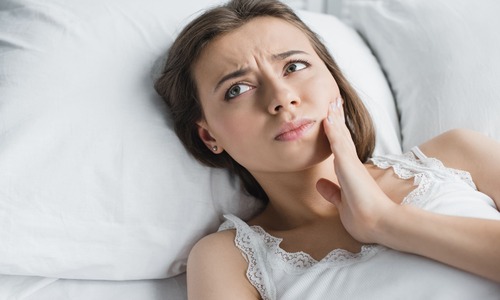Why Am I Clenching My Teeth at Night?
Clenching, grinding, or gnashing of teeth is a common activity that people can experience at some point in their lives. “Why Am I Clenching My Teeth at Night” However, its severity and duration vary as per individual circumstances. When teeth clenching becomes a frequent, prolonged dental issue, the dental condition is called bruxism.
Have you been clenching your teeth at night and don’t know the reason behind it? or are you looking for a solution to stop your teeth from clenching? Read this post by dental experts to learn everything you need to know about teeth clenching at night.
What is Teeth Clenching?
Teeth clenching is holding together the teeth and tightening of the jaw muscles. It can occur when the person is awake especially when the person is stressed, angry, or trying to concentrate. When it happens during nighttime, it is not in control of the individual and usually it occurs the whole night at the time of arousal when a person goes from a deeper sleep stage to a lighter sleep stage.
What are the Signs that I have been Clenching My Teeth at Night?
Clenching of teeth generally leads to less obvious wearing of the teeth. However, it can still result in substantial muscular pain, soreness, and damage to the jaw joint. Chronic clenching of the teeth at night often leads to:
- Facial pain and fatigue, especially in the jaw area or jaw dysfunction in the morning
- Clicking or popping of the jaw joints in the morning
- Enlarged jaw muscles
- Headache
- Teeth becoming loose, sensitive, or painful
- Teeth having chip, crack, or worn-down enamel
- Disturbed sleep of the person sleeping next to you due to loud sound made by teeth clenching.
Why am I Clenching My Teeth at Night?
Physical and emotional stressors are the main causative factors of teeth clenching. Here are the top reasons that you could be clenching your teeth at night:
- Stress and anxiety- Stressed or anxious people may clench their teeth during sleep as a coping strategy. Stress can be physical or emotional. Physical stressors include nutrition, fitness level, general well-being, and sleep habits. While, emotional stressors include a highly stressful work environment, financial problems, and relationship challenges. Stress relieving techniques, meditation, and psychoanalysis can all help alleviate stress or anxiety-induced teeth clenching at night.
- Tobacco use or alcohol intake- Heavy use of tobacco or alcohol consumption at night can make an individual more likely to suffer from teeth clenching. Both tobacco and alcohol use can affect the sleep cycle and result in frequent REM interruptions or sleeplessness. These symptoms are commonly accompanied by teeth clenching. Therefore, it is advised to limit these substance use or quit them for the good of the teeth and general health.
- Taking caffeine before bed- There seems to be a link between nighttime consumption of caffeine and teeth clenching during sleep. Intake of caffeine before bedtime can lead to poor sleep and teeth clenching because caffeine spikes energy levels and heart rate. Therefore, it is advised to break this habit and try to switch to non-caffeinated drinks or water.
- Sleep disorder- Snoring or obstructive sleep apnea can frequently cause sleep interruption and subsequently result in clenching of the teeth.
How Can a Dentist help me Get Rid of Clenching Teeth at Night?

A dentist will first clinically examine your teeth and review your medical records to diagnose sleep bruxism. However, in some cases, an overnight sleep study may be required to be conducted by a physician. A dentist will usually treat teeth clenching problems with custom bite guards or splints that the patient should wear over their upper or lower teeth set before going to bed.
A bite/night guard or dental night guards can help reduce the wearing down of the teeth subject to grinding by cushioning them. It may even provide symptomatic relief of jaw pain and dysfunction. A dentist will custom design a bite guard with hard plastic and ensure that it covers all the teeth in the dental arch. Sometimes, the use of muscle relaxants for a few days can help minimise the adverse effects of teeth clenching at night. In case of anxiety or depression-induced teeth clenching at night, short-term control of teeth clenching is possible with anti-anxiety medications and antidepressants.
In severe cases of teeth clenching during sleep, a dentist may recommend jaw exercises to help relax and soothe overworked jaw muscles. When the teeth have become sensitive or cannot chew properly due to severe tooth wear, a dentist may reshape the chewing teeth surface or place a dental crown to repair the tooth damage.
How Do I Stop Clenching My Teeth at Night While Sleeping?
After figuring out the cause of your teeth clenching at night, you can go for lifestyle and home remedies to stop experiencing teeth clenching while sleeping. Here are some measures:
- Manage stress or anxiety with relaxation techniques, yoga or meditation, and certain medications.
- Practise good sleep habits and get treated for any underlying sleep problems.
- Talk to the person who sleeps next to you to take note of teeth clenching so that you can report it to your dentist for relief.
- Avoid intake of stimulating substances in the evening or before going to bed.
- Make regular dental appointments to examine your teeth to check for signs of teeth clenching.
If you have teeth grinding problems, then First Point Dental experts can help you. For more details on dental night guards, book your appointment today.

